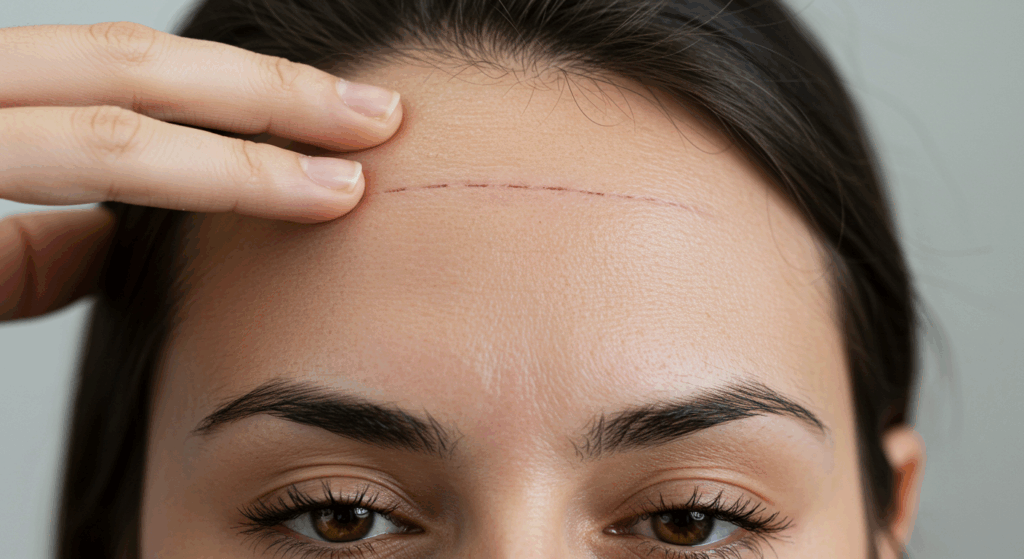Unterziehen einer coronal Einschnitt Verfahren is a significant step, whether for medical or cosmetic reasons. Proper pre-operative Vorbereitung is crucial for ensuring a smooth Operation and optimal Wiederherstellung. Das Führung provides a comprehensive, step-by-step breakdown of everything you need to know before your procedure, from medical evaluations to lifestyle adjustments.
By following these guidelines, you’ll minimize Risiken, enhance recovery, and achieve the best possible outcome. Let’s dive into the essential preparations you need to make.

Inhaltsverzeichnis
1. Medizinische Untersuchungen und Beratungen
1.1. Präoperative medizinische Untersuchung
Before your Koronarinzisionsverfahren, your surgeon will conduct a thorough medical assessment to ensure you’re a suitable candidate. This typically includes:
- Bluttests: Zur Überprüfung auf Infektionen, Anämie oder Gerinnungsstörungen.
- Elektrokardiogramm (EKG): Zur Beurteilung der Herzgesundheit, insbesondere bei Patienten über 40 oder mit einer Vorgeschichte von Herzerkrankungen.
- Chest X-Ray: Um die Lungengesundheit zu beurteilen und Atemwegsprobleme auszuschließen.
- Allergietests: To identify potential allergic reactions to Anästhesie or medications.
1.2. Beratung mit Ihrem Chirurgen
Während Ihrer Konsultation wird Ihr Chirurg:
- Besprechen Sie Ihre Krankengeschichte, einschließlich früherer Operationen, chronischer Erkrankungen und Medikamente.
- Erklären Sie das Verfahren im Detail, einschließlich Risiken, Nutzen und erwarteten Ergebnissen.
- Geben Sie präoperative Anweisungen, die auf Ihre spezifischen Bedürfnisse zugeschnitten sind.
For more insights on preparing for Operation, check out our guide on wie man sich auf eine Schönheitsoperation vorbereitet.
2. Anpassungen des Lebensstils vor der Operation
2.1. Diät und Ernährung
Your diet plays a critical role in preparing your Körper for surgery. Focus on:
- Flüssigkeitszufuhr: Trinken Sie täglich mindestens 8 Gläser Wasser, um hydriert zu bleiben.
- Ausgewogene Ernährung: Consume a diet rich in proteins, vitamins, and minerals to support Heilung. Include lean meats, fruits, vegetables, and whole grains.
- Vermeiden Sie Alkohol und Koffein: Beides kann zu Dehydrierung führen und die Narkose beeinträchtigen.
2.2. Rauchen und Nikotin
Smoking and nicotine use can impair healing and increase the risk of Komplikationen. It’s essential to:
- Hören Sie mindestens 4 Wochen vor der Operation mit dem Rauchen auf.
- Vermeiden Sie Nikotinpflaster, -kaugummi oder -vaping-Produkte.
2.3. Bewegung und körperliche Aktivität
Obwohl es wichtig ist, aktiv zu bleiben, sollten Sie in der Woche vor der Operation anstrengende Übungen vermeiden. Konzentrieren Sie sich auf leichte Aktivitäten wie Gehen, um den Kreislauf in Schwung zu halten.
3. Medikamentenmanagement
3.1. Zu vermeidende Medikamente
Bestimmte Medikamente können Blutungen verstärken oder die Narkose beeinträchtigen. Ihr Chirurg rät Ihnen möglicherweise, Folgendes zu vermeiden:
| Medikamententyp | Beispiele | Wann sollte man aufhören? |
|---|---|---|
| Blutverdünner | Aspirin, Warfarin, Ibuprofen | 2 Wochen vor der Operation |
| Pflanzliche Nahrungsergänzungsmittel | Ginkgo Biloba, Knoblauch, Ginseng | 2 Wochen vor der Operation |
| Vitamin E | Hochdosierte Nahrungsergänzungsmittel | 2 Wochen vor der Operation |
3.2. Zugelassene Medikamente
Your surgeon may prescribe or approve certain medications to manage Schmerz or prevent infections post-surgery. Always follow their instructions regarding:
- Antibiotika zur Vorbeugung von Infektionen.
- Schmerzmittel für postoperativen Komfort.
4. Logistik und Planung
4.1. Transport organisieren
You won’t be able to drive immediately after surgery. Arrange for a friend or family member to drive you heim post-procedure.
4.2. Bereiten Sie Ihren Wiederherstellungsbereich vor
Richten Sie zu Hause einen komfortablen Erholungsbereich ein mit:
- Kissen, um Ihren Kopf hoch zu lagern.
- Ice packs to reduce Schwellung.
- Einfach zuzubereitende Mahlzeiten und Snacks.
- Unterhaltung wie Bücher, Filme oder Musik.
4.3. Plan für die postoperative Versorgung
Stellen Sie sicher, dass Ihnen in den ersten 24 bis 48 Stunden nach der Operation jemand zur Seite steht. Diese Person kann Ihnen bei Folgendem helfen:
- Verabreichung von Medikamenten.
- Zubereitung von Mahlzeiten.
- Unterstützung bei der Mobilität.
Weitere Tipps zur Wiederherstellung finden Sie in unserem Artikel über Tipps für eine reibungslose Genesung nach der Operation.
5. Mentale und emotionale Vorbereitung
Eine Operation kann eine emotionale Belastung sein. So bereiten Sie sich mental darauf vor:
- Informieren Sie sich: Informieren Sie sich über das Verfahren, den Genesungsprozess und die zu erwartenden Ergebnisse, um Ängste abzubauen.
- Setzen Sie realistische Erwartungen: Understand that recovery takes time and Ergebnisse may not be immediate.
- Entspannungstechniken üben: Meditation, tiefes Atmen oder Yoga können helfen, Stress zu bewältigen.
6. Risiken und Komplikationen verstehen
Jeder chirurgische Eingriff birgt Risiken. Zu den möglichen Komplikationen bei einer Koronarinzision gehören:
- Infektion an der Einschnittstelle.
- Blutungen oder Hämatome.
- Nervenschäden, die zu Taubheit oder Schwäche führen.
- Scarring or Haar loss along the incision line.
Um mehr über Risiken zu erfahren, besuchen Sie unseren Artikel über endoskopisches vs. koronales Stirnlifting: Vor- und Nachteile.
7. Checkliste vor der Operation
Verwenden Sie diese Checkliste, um sicherzustellen, dass Sie vollständig auf Ihren Koronalschnitt vorbereitet sind:
| Aufgabe | Vollendet |
|---|---|
| Führen Sie alle präoperativen medizinischen Tests durch | |
| Konsultieren Sie Ihren Chirurgen und klären Sie alle Fragen | |
| Passen Sie Ihre Ernährung an und vermeiden Sie Alkohol, Koffein und Rauchen | |
| Beenden Sie die Einnahme von Blutverdünnern und pflanzlichen Nahrungsergänzungsmitteln | |
| Organisieren Sie den Transport und die postoperative Versorgung | |
| Bereiten Sie Ihren Erholungsraum zu Hause vor | |
| Üben Sie Entspannungstechniken, um Stress zu bewältigen |

Fazit: Ihr Weg zum erfolgreichen Eingriff
Wichtigste Erkenntnisse
- Eine angemessene präoperative Vorbereitung ist unerlässlich, um Risiken zu minimieren und eine reibungslose Genesung zu gewährleisten.
- Befolgen Sie die Anweisungen Ihres Chirurgen bezüglich medizinischer Untersuchungen, Anpassungen des Lebensstils und Medikamentenmanagement.
- Planen Sie die postoperative Versorgung und bereiten Sie Ihren Erholungsraum im Voraus vor.
- Informieren Sie sich über die potenziellen Risiken und Komplikationen, die mit der Koronarinzision verbunden sind.
Nächste Schritte
Nachdem Sie nun mit diesem umfassenden Leitfaden ausgestattet sind, führen Sie die folgenden Schritte aus:
- Planen Sie Ihre präoperativen medizinischen Untersuchungen.
- Wenden Sie sich bei allen verbleibenden Fragen an Ihren Chirurgen.
- Beginnen Sie, Ihren Lebensstil anzupassen, um Ihren Körper auf die Operation vorzubereiten.
- Organisieren Sie die Logistik wie Transport und postoperative Versorgung.
Häufig gestellte Fragen (FAQ)
1. Wie lange dauert die Erholung nach einer Koronarinzision?
Die Genesungszeit variiert, die meisten Patienten können jedoch innerhalb von 2–4 Wochen wieder ihren normalen Aktivitäten nachgehen. Eine vollständige Genesung kann mehrere Monate dauern.
2. Werde ich nach dem Eingriff sichtbare Narben haben?
The coronal incision is typically made along the Haaransatz, which helps conceal scars. However, some scarring may be visible initially but usually fades over time.
3. Kann ich meine Haare nach der Operation waschen?
Sie müssen mindestens 48 Stunden nach der Operation auf das Haarewaschen verzichten. Ihr Chirurg wird Ihnen genaue Anweisungen geben, wann Sie wieder sicher mit dem Haarewaschen beginnen können.
4. Was sollte ich am Tag der Operation anziehen?
Tragen Sie lockere, bequeme Kleidung, die Sie nicht über den Kopf ziehen müssen. Vermeiden Sie Schmuck, Make-up oder Kontaktlinsen.
5. Wie kann ich die Schmerzen nach dem Eingriff lindern?
Ihr Chirurg wird Ihnen Schmerzmittel verschreiben, um die Beschwerden zu lindern. Das Auflegen von Eisbeuteln auf den Einschnittbereich kann ebenfalls helfen, Schwellungen und Schmerzen zu lindern.
6. Gibt es nach der Operation irgendwelche Ernährungseinschränkungen?
Halten Sie sich in den ersten Tagen an weiche, leicht verdauliche Lebensmittel. Vermeiden Sie scharfe, knusprige oder schwer zu kauende Lebensmittel, die den Einschnittbereich belasten könnten.
7. Wann kann ich wieder arbeiten?
Die meisten Patienten können je nach Art ihrer Tätigkeit innerhalb von 2–3 Wochen wieder arbeiten. Vermeiden Sie anstrengende Tätigkeiten für mindestens 4–6 Wochen.
8. Was sind die Anzeichen einer Infektion nach der Operation?
Achten Sie auf Symptome wie verstärkte Schmerzen, Rötungen, Schwellungen oder Ausfluss aus der Einschnittstelle. Fieber oder Schüttelfrost können ebenfalls auf eine Infektion hinweisen. Kontaktieren Sie sofort Ihren Chirurgen, wenn Sie eines dieser Anzeichen bemerken.
Besuchen Dr.MFO Instagram-Profil um echte Patiententransformationen zu sehen! Erhalten Sie einen Einblick in die unglaublichen Ergebnisse, die durch Gesichtsbehandlungen erzielt werden Feminisierungschirurgie und andere Verfahren. Das Profil zeigt Vorher-Nachher-Bilder. Fotos diese Hervorhebung Dr.MFO's Fachwissen und künstlerische Vision bei der Schaffung natürlich aussehender, schöner Ergebnisse.
Bereit für den nächsten Schritt auf Ihrer Reise? Planen Sie einen kostenlose Beratung mit Dr.MFO ( Bester Chirurg für Gesichtsfeminisierung für Sie) heute. Während der Beratung können Sie Ihre Ziele besprechen, alle Ihre Fragen stellen und mehr darüber erfahren, wie Dr.MFO kann Ihnen helfen, Ihren gewünschten Look zu erreichen. Zögern Sie nicht, diese kostenlose Gelegenheit zu nutzen, um Ihre Optionen zu erkunden und zu sehen, ob Dr.MFO passt zu Ihnen.








